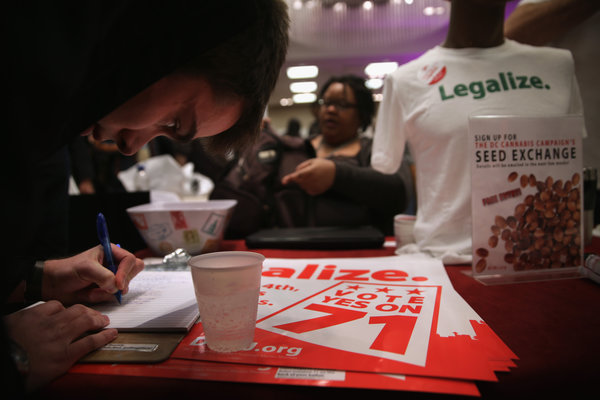CarolKing
Singer of songs and a vapor connoisseur
Photo

Signing up for a seed exchange event during a cannabis conference in Washington, D.C., in February. CreditAlex Wong/Getty Images
The district’s lawmakers aren’t happy about the process, but maybe they should be pleased about the outcome. Mark Kleiman, a leading expert on drug policy at the University of California, Los Angeles, has been arguing for Washington’s “grow-and-give” approach for years. He is one of several researchers affiliated with the RAND Corporation who have been urging states to look for intermediate options between prohibition and commercial legalization. They have urged states to consider approaches like nonprofit cooperatives, a government monopoly on marijuana production or a grow-your-own rule like the one Washington has ended up with, essentially by accident.
Drug prohibition imposes many costs. People go to jail for using and trading in drugs, causing major disruption to individuals’ lives and to communities. Illegal markets breed crime, including violent crime, because people in the drug business can’t use the courts to enforce contracts and settle disputes. And prohibition reduces access to a product that many people enjoy and use responsibly — though it’s not that hard to buy marijuana even where it’s illegal.

Signing up for a seed exchange event during a cannabis conference in Washington, D.C., in February. CreditAlex Wong/Getty Images
The district’s lawmakers aren’t happy about the process, but maybe they should be pleased about the outcome. Mark Kleiman, a leading expert on drug policy at the University of California, Los Angeles, has been arguing for Washington’s “grow-and-give” approach for years. He is one of several researchers affiliated with the RAND Corporation who have been urging states to look for intermediate options between prohibition and commercial legalization. They have urged states to consider approaches like nonprofit cooperatives, a government monopoly on marijuana production or a grow-your-own rule like the one Washington has ended up with, essentially by accident.
Drug prohibition imposes many costs. People go to jail for using and trading in drugs, causing major disruption to individuals’ lives and to communities. Illegal markets breed crime, including violent crime, because people in the drug business can’t use the courts to enforce contracts and settle disputes. And prohibition reduces access to a product that many people enjoy and use responsibly — though it’s not that hard to buy marijuana even where it’s illegal.


 Some are comparing this to making your own wine and beer. I like that analogy.
Some are comparing this to making your own wine and beer. I like that analogy.


 . Still it's great progress. I went on youtube and found a video about the seed giveaway in D.C.
. Still it's great progress. I went on youtube and found a video about the seed giveaway in D.C.






